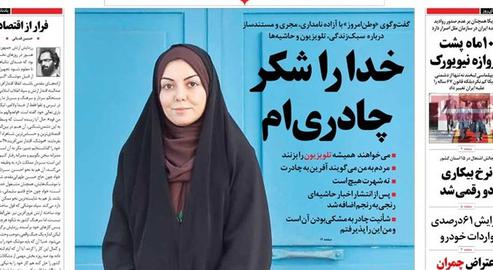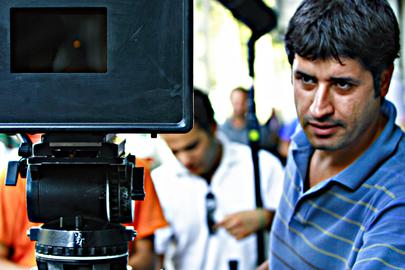“Thank God, I wear chador in the masculine environment where I work. Thank God that I work in TV and wear chador. Thank God when I go on the air, I wear chador. Most of the time I felt safe and respected. These are all the blessings of chador and what I owe it. I apologize for saying this, but I am more beautiful with chador.”
These are the comments of Azadeh Namdari, who has been a television host for more than 10 years. In fact, this is not an exhaustive list of her statements praising chador — whether on TV programs that she has hosted, in interviews, or when posting on social network platforms. It is mandatory for women to wear hijab in the Islamic Republic, though not chador. Wearing chador is usually regarded to be a mark of total belief in Islamic edicts, and an absolute commitment to Iran's Islamic system.
But then a video of Namdari not wearing chador — or even hijab — was posted online. Plenty of people had something to say about this, with many going on to social media to accuse the presenter of being a “hypocrite” and a “liar.”
Azadeh Namdari has often been a controversial TV personality. She wears colorful scarves under her black chador, has a gentle voice and a charming face and, in contradiction of common practice in today’s Iran, jokes with men on air. She was married to TV host Farzad Hosseini, but a year into her marriage, she posted pictures of herself with a black and blue, swollen face — the result of her husband’s beatings — and soon divorced him. At the time, some people on social media objected to the online photos, saying they violated the sanctity and privacy of the family. Now, after many years of defending the virtues of wearing the Islamic headscarf, photos of her not wearing hijab having been bandied about online.
In the recently-released video and accompanying photos, Namdari is in a public park in Switzerland wearing a light-colored dress with her head uncovered. Photos show her holding her child and rocking her carriage. She sits next to her husband and an older woman, who is also not wearing hijab. There are beer bottles on the table and she drinks from one, although some commented that it could have been non-alcoholic beer.
The publication of the photographs and video forced Namdari to respond, and she quickly posted a video online. In it, she faces the camera, once again clad in black chador. “I don’t feel well,” she says in the video, “and I feel sorry for the people who snoop into the lives of others, including mine. I was sitting with people related to me in a green environment. My scarf had slipped just for a moment.”
But the photos tell a different story. There is no scarf around her neck to prove this claim. She has argued that people who circulate the images of her are violating her privacy. Some people posting on social media agree the video was a violation of her privacy, but objected to her behavior nonetheless. Others commented that when Namdari was outside Iran, her hijab is her own business — despite the fact that obligatory hijab in Iran is not a personal choice and Namdari has been applauding it for years.
Azadeh Namdari was the first woman who wore on TV what has become known as “national chador,” a chador with sleeves, closed in front. She takes credit for the popularity of this style. In an interview in 2014, she claimed that many teenage and young women had taken to chador because of her. “You won’t believe how many people have told me: ‘we are wearing chador because of you,’” she told the newspaper Vatan-e Emrouz. “’What an elegant woman! We are so happy that you wear a chador.’”
Azadeh Namdari’s Instagram page has close to 470,000 followers, giving her confidence that she has had an impact on Iranian society, and on women in particular. “People are still sensitive about [showing even] a single strand of hair and say ‘bravo for your chador!,’” she said once. For her, the number of “likes” she receives is an indicator of how Iranian women approach social and women’s issues.
Is Namdari a Feminist?
But, contrary to what one might expect, many hardliners do not like her. They say that she has not made her position about “sedition” — the term conservatives use to refer to the disputed 2009 presidential election and the unrest that followed — clear. They don’t like the fact that she jokes with men on TV programs she hosts and that she has called non-conventional women such as truck drivers “role models” for women. For them, Azadeh Namdari is a “feminist,” an anathema to true Muslims.
Namdari denies the “feminist” label because she says she hates holding “extremist views.” And yet she has made comments that many would considered to be in line with feminism. “I don’t like to say which ones are better, men or women,” she has said, “but I do believe that there must be a minimum level of equality. This is not a feminist view.”
Namdari has hosted a series of programs about the wives, mothers and daughters of those who lost their lives during the 1980-1988 Iran-Iraq War. In 2011, she published a collection of short stories based on their narratives. Two of the episodes won her prizes at the the 2010 Ammar Film Festival in Tehran, a festival that touts itself as a “revolutionary” alternative for Iran’s documentary filmmaking.
After this, in 2015, Azadeh Namdari found her way to the big screen, appearing in a film by the acclaimed Iranian director Parviz Shahbazi. The film, Malaria, was premiered in 2016 at the Venice Film Festival and won the Grand Prix at the 2016 Warsaw International Film Festival. Stills were published before the movie was premiered, showing Azadeh Namdari without chador. This was also big news in Iran, with one headline reading: “When Azadeh Namdari took off her chador.” When she went back on air in Iran, she was wearing chador.
It’s hard to predict what will happen next, but it’s safe to assume that Azadeh Namdari will find a way to rescue her professional life. She has proven to be a skilled actor and operator — and she has had save her reputation before.
visit the accountability section
In this section of Iran Wire, you can contact the officials and launch your campaign for various problems




























comments